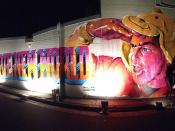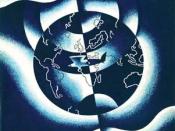Aldous Huxley wrote Brave New World in the 1930's. During this time the world was making its first steps in scientific and technological advances. These advances were seen not only as evidence of man's progress but also as a tremendous hope for mankind. People began to become more and more captivated with scientific progress and less and less interested in the ethical questions this progress raised. Huxley's novel shows that he felt that the hope for mankind lay not in technology but in man himself. He feared that unchecked research in science and technology was inherently dangerous, and that the misuse of knowledge can have dire consequences. He also feared that people would become so content to have all their diseases cured and their problems eliminated that they would allow their basic freedoms eliminated as well. Brave New World offers a picture of the world as it might become if man allows science to rule him rather than man ruling science.
We are all familiar with the debates that are presently underway on the topic of the extraordinary breakthroughs in science, especially on the subject of cloning. People are trying to determine whether these new realities of life will enhance life, or if they will cause the destruction of society and life as we know it. When thinking of progress, most people think of advances in the scientific fields, believing that most discoveries and technologies are beneficial to society. Are these advances as beneficial as most people think? In the novel Brave New World, the author Aldous Huxley, warns readers that scientific advances can be a threat to society. This is particularly evident in the fields of biology, technology and psychology.
One scientific advance of which Huxley warns readers of is that in biology. In the setting of Brave New World the mass production of humans is accomplished with the Bokanovsky process. In this process, human beings are genetically engineered in laboratories. "... a bokanovskified egg will bud, will proliferate, will divide. From eight to ninety-six buds, and every bud will grow into a perfectly formed embryo, and every embryo into a full sized adult"(6). One of the threats of this genetic breeding is that no family structures exist. Instead, humans are raised in conditioning centers. Children raised in this way, without parents, will grow up into unaffectionate individuals who have no real emotions and do not know how to truly love. Another threat that the Bokanovsky process poses to society is that life is not highly valued. "Murder kills only the individual and, after all what is an individual? With a sweeping gesture he indicated the rows of microscopes, the test-tubes, the incubators. We can make a new one with the greatest ease-as many as we like"(148). Human life holds no value because it can be easily replaced through the Bokanovsky process. Furthermore, Bokanovsky's method of mass production prevents individuality, all people are cloned. Starting from the time of decanting, each embryo is genetically cloned to fall into one of the various social classes. Within each social class, all members are cloned to be intellectually and physically equivalent. Biological technology helps to achieve this equality by genetically shaping the minds of society. In Brave New World , one's intelligence depends on the amount of alcohol injected into their embryo. For example, one of the lower classes in society, Epsilons, have quite a high amount of alcohol injected in the decanting process. Another key factor in the process is oxygen deprivation. The lower the caste, the less oxygen they are given, according to Mr. Foster. Less oxygen reduces brain capacity and therefore lowers intelligence. Mental faculty, therefore, is predestined from the moment of cloning. The Bokanovsky process involves mass production, an important idea in industrialized society. By creating a world where humans are mass produced, Brave New World demonstrates that advances in biology can be dangerous if used without regard for the well being of the human race. Here we see that a major factor to stability that the novel implies is that individuality must be absent. The government in Brave New World understands that fact and in the words of one of the ten controllers of the world states, "[there is] no civilization without social stability. No social stability without individual stability"(42). The need for stability creates a government that believes that stability can be achieved if people think and look the same.
According to Huxley, advances in technology can also be a threat to society. In Brave New World, everything is completely mechanized, eliminating the need for creativity and imagination. Man's creativity is replaced with mundane tasks, because machines are able to do much of the work . The occupations available for people consist of repetitive mechanical operations. In Brave New World, leisure activities are dominated by technology. The primary source of entertainment is the "feelies," a type of movie theatre in which all the senses are artificially created. Instead of feeling the emotions portrayed on screen, the audience absorbs stimulated sensations. These stimulations prevent them from free thought, which threatens society by denying people from experiencing their own creativity and imagination. Individual expression is prevented by the lack of art and culture. The Controllers in Brave New World suggest that "you've got to choose between happiness and what people used to call high art. We've sacrificed the high art". Without literature like Shakespeare and other classics, people will never think and learn, of course they will live in a stable society where nothing will ever change, but people pay the price of creativity and the ability to think. The Controllers see the purpose of life as just maintenance of well being, not as some enlargement of knowledge.
Furthermore, technology affects entertainment by being incorporated into all games of play. Games consist of advanced technological apparatus, and low organization, creating very superficial entertainment. This frustrates one of humanity's vital needs to be creative. Once again we see the oppression of creativeness.
Among technological advances, one danger Huxley warns of is the advance in pharmacology. In Brave New World, an artificial form of happiness is present in a drug called soma. Soma propels the user into a hallucinatory dream world, providing relief from negativity, allowing constant happiness. People are rewarded for work by receiving rations of soma. The soma ration varies according to the social classes, with the lowest classes receiving the least, and the highest classes receiving the greatest. Society is conditioned to believe that "One cubic centimetre cures ten gloomy sentiments"(53). This reasoning deceives the user into believing that soma is a cure-all remedy. Since soma has no side effects, it can be a threat to society because people may be drugged into a hallucinatory dream world twenty-four hours a day. It could be used as a drug not to escape the pressures of life, but to escape life itself. Huxley shows that when the citizens were either alone or had a moment of free time, creative forces tended to creep out. This is when it was most appropriate to take soma tablets, when the individual is conscience of being an individual. Similar to biology, technology can be a danger to society if used without regard for the welfare of mankind.
Finally, the most dangerous of all scientific advancements Huxley warns of, is the progress in psychology. In Brave New World, every person is conditioned. The first conditioning technique used is subliminal training. This type of psychology is utilized to program ideas into individual's minds by a method called hypnopaedia. Hypnopaedia consists of repetitious messages that play over a loudspeaker during sleep. These repetitions are composed of socially accepted morals and values. "All conditioning aims at making people like their unescapable social destiny."(16). This limits individuals from exploring life and developing their idea of happiness when "happiness" is already predetermined in their minds. The conditioned happiness of Brave New World cuts men off from deep experience, keeps them from being human. Direct stimulation is used as another conditioning technique. Society is conditioned against love, nature, literature, and other forms of expression that are naturally desired by man. To condition babies against nature and literature, they are mildly shocked while encountering books and flowers placed before them. Therefore, this direct stimulation causes them to have an instinctive hatred of flowers and books. According to reservation controllers, "A love of nature keeps no factories busy"(23). Morals and values, which normally through the growing up process can be discovered on their own, are brainwashed into society's minds. This direct stimulation is harmful to society as it prevents people from deciding upon their own morals and values. The conditioning of the children forms a barrier in their minds, so that they are never free to decide for themselves, but are always restricted by the instructions of the state. Another form of conditioning in Brave New World deals with death. From the early age of eighteen months, children are exposed to death while playing with toys and eating candy. Thus resulting in an eternal association between happiness and death. Death conditioning can be dangerous to society as children become unable to distinguish between good and evil. In addition, sexual conditioning is present in Brave New World. From a very young age, sexual play is normal and encouraged in everyone. Together, hundreds of children play sexual games in the nude. Also, more than one sexual partner is encouraged, resulting in the absence of committed relationships. This absence of committed relationship creates a world without deep feelings of human affection. Society is conditioned to believe "Everyone belongs to everyone else"(43). Unfortunately, these psychological advancements cause the reservation to be a world without individual thought. Each person is conditioned into a life, which is believed to be most advantageous for them. However, the citizens of Brave New World are more similar to animals than humans. The conditioning methods in Brave New World take away all freedom of choice and decision in society.
The society depicted in Brave New World is to many, a frightening one. Though, it may be more of a reality than is presently thought. Society must ensure that science is changing to suit human needs, rather than changing the human race to suit science. With the increasing progress in biology, technology and psychology, this may be an impossible feat to overcome. The world may one day be without individuality, emotions or free thought.
Through genetic engineering, psychological conditioning, and drugs(all of which are used today), the World Controlers in Brave New World were able to achieve complete social stability. But at what cost? Sure there are positive aspects of this "utopia" such as no war or suffering, no disease or social conflict and no poverty. However, for these few advantage society pays a very high price. There is no love, family, science, art, religion, and history, all of which are very important in our society. This demonstrates that technology has the ability to change the world, the true question is if this change is for the better or worse. Brave New World demonstrates that when it comes to technology, ethics are simply not negotiable. Science and technology should serve man, not the other way around, and ethics and morality should always present a higher priority than the ongoing quest of scientific discovery.


